Choosing the right ecommerce platform can be a make or break for creating a successful online store. You’ve probably come across two of the big players in the game: WooCommerce and Magento. Both platforms offer unique features that simplify the process of creating an online store. It can be challenging to determine which one is right for your business. In this guide, we will explore their unique offerings and help you decide which one will have your online store soaring to new heights!
What is WooCommerce?
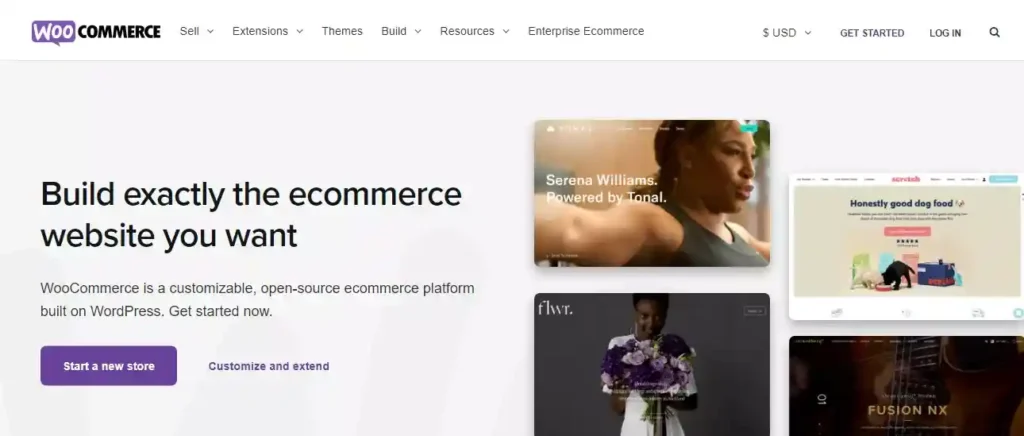
WooCommerce, launched in 2011, is one of the most popular ecommerce platforms. This plugin uses WordPress, the most widely used web-based CMS. It is extremely user-friendly with an easy-to-follow setup procedure. It also includes numerous extensions for adding more functionality.
What is Magento?

Magento, AKA Adobe Commerce, is a powerful, open-source e-commerce platform designed to help businesses build and manage their online stores. Developed by Varien Inc. and later acquired by Adobe, Magento offers a range of features and tools that enable store owners to create customizable, scalable, and secure e-commerce websites. It gives users complete control over their website’s codebase, allowing them to customize nearly everything they need.
Magento offers two main editions: Magento Open Source (formerly known as Magento Community Edition) and Magento Commerce (formerly Magento Enterprise Edition).
Magento vs WooCommerce: Comparison at a Glance
Here’s a quick comparison table highlighting the key differences between Magento and WooCommerce:
| Feature | WooCommerce | Magento |
| Ease of Use | User-friendly, especially for WordPress users | Steeper learning curve, more complex |
| Customizability | Highly customizable with themes and plugins | Highly customizable with themes and extensions |
| Scalability | Suitable for small to medium-sized stores | Ideal for large or rapidly growing stores |
| Built-in SEO Features | Good, relies on plugins like Yoast SEO | Robust, with advanced built-in SEO capabilities |
| Performance | Good for small to medium-sized stores | High performance, handles large product catalogs |
| Plugins/Extensions | Wide range available, both free and premium | Wide range available, both free and premium |
| Cost | Free to download, costs for hosting and plugins | Free (Open Source) and paid versions, higher cost |
| Community | Large and active community, WordPress forums | Strong community, Magento forums and DevDocs |
| Security | Depends on WordPress and user’s security measures | Dedicated security patches and updates |
Magento vs WooCommerce
Now, we’ll compare Magento and WooCommerce in detail based on ease of use, scalability, customizability, features, plugins/extensions, cost, community, security, features, payment processors, and web hosting performance.
Ease of Use
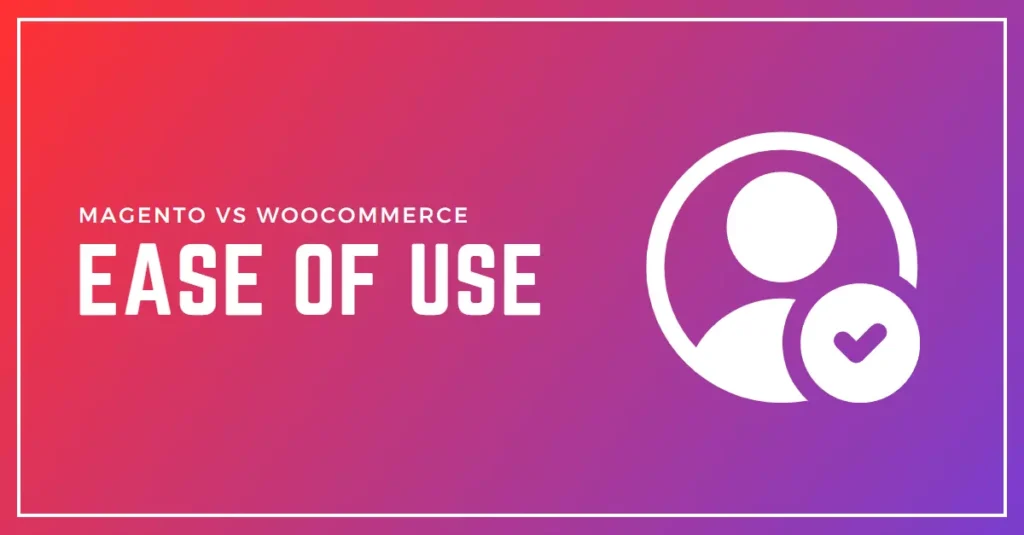
How user-friendly is WooCommerce?
As a WordPress plugin, WooCommerce is easy to set up and manage, making it ideal for beginners and non-technical users. The familiar WordPress interface and integration streamline the process of launching an e-commerce store.
The WooCommerce setup wizard guide helps you through the initial steps, including configuring shipping, taxes, and payment options. The WP admin dashboard makes it simple to manage products, orders, and customers.
How user-friendly is Magento?
Magento has a steeper learning curve compared to WooCommerce, as it requires web development knowledge to leverage its capabilities thoroughly. However, it offers more advanced features for experienced developers.
To set up and manage a Magento store, you may need to hire a Magento developer or have development experience yourself. This can be a barrier for some businesses, but the trade-off is access to a more robust and feature-rich platform.
Magento vs WooCommerce: Which platform is more beginner-friendly?
Generally, WooCommerce is more beginner-friendly due to its seamless integration with WordPress and its user-friendly interface.
Scalability
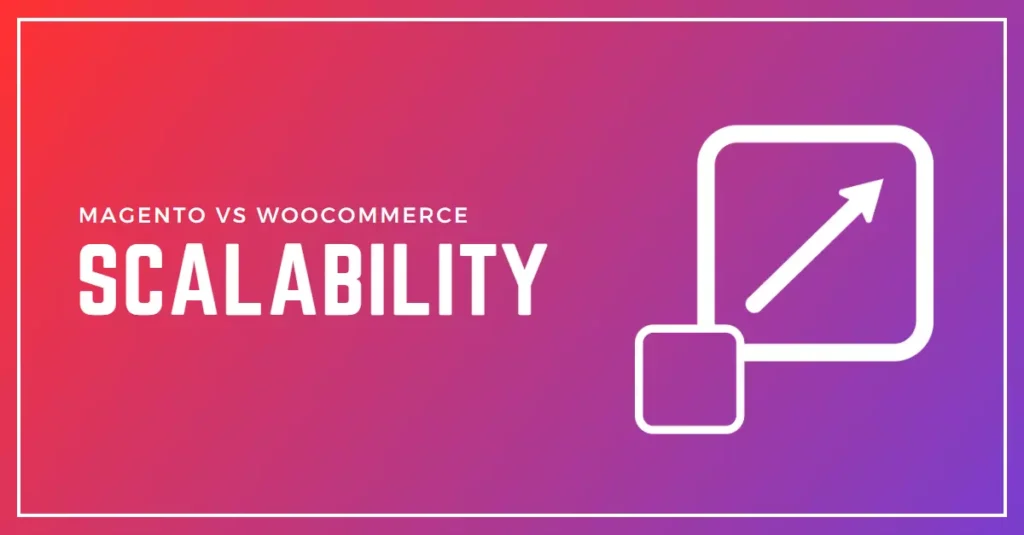
How scalable is WooCommerce?
While WooCommerce is suitable for small to medium-sized businesses, it may face limitations for large-scale e-commerce stores. According to BuiltWith, 29% of the top 1 million e-commerce websites use WooCommerce, indicating its popularity among smaller businesses.
Your store’s scalability on WooCommerce depends heavily on your web hosting provider. Choosing a reliable and high-performance hosting provider can help you scale your store as it grows.
How scalable is Magento?
Magento is built for scalability, making it ideal for businesses with ambitious growth plans. It offers powerful performance and can support thousands of products and customers without compromising speed or functionality.
Magento Commerce and Enterprise Edition offer advanced features designed for larger businesses. Magento Cloud, a hosting solution specifically designed for Magento stores, provides scalability features to support your store’s growth.
Magento vs WooCommerce: Which platform is better for scaling your online store?
While both ecommerce platforms can support growing businesses, Magento is better suited for larger-scale operations due to its built-in scalability features.
Customizability
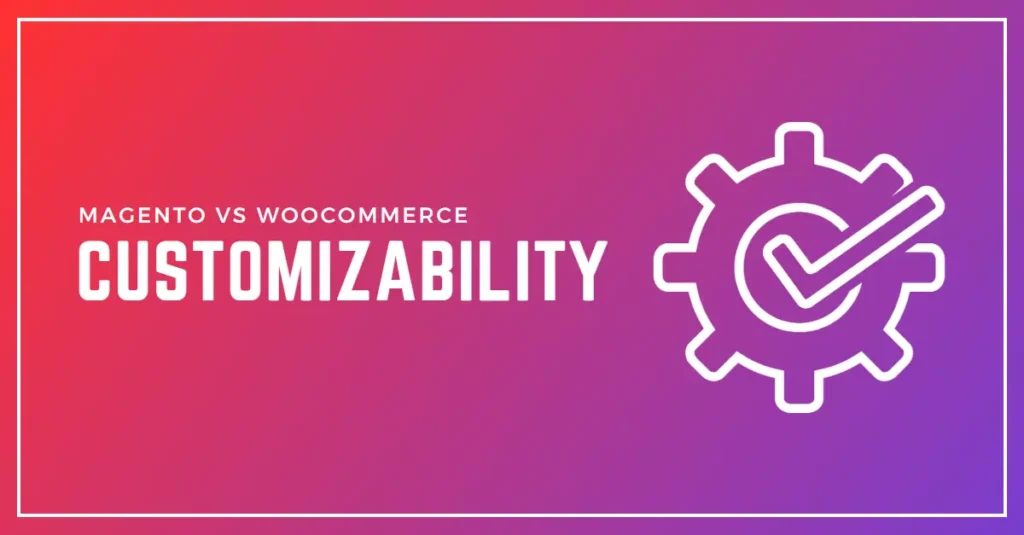
How customizable is WooCommerce?
WooCommerce is highly customizable, thanks to its compatibility with thousands of WordPress themes. You can choose from a wide range of designs and styles to match your brand identity. WordPress currently lists over 10,000+ free themes, many of which are compatible with WooCommerce, giving you plenty of options.
With 60,000+ plugins available in the WordPress repository, you can easily add new functionality to your store by installing plugins tailored to your needs.
How customizable is Magento?
Magento is also highly customizable, thanks to its open-source nature and a vast marketplace of extensions. The Magento Marketplace lists 5,000+ extensions, allowing you to add a wide range of features to your store.
However, Magento customization often requires development knowledge or the assistance of a Magento developer. While this can be a challenge for some businesses, it also means you have the potential for more powerful, unique and specialized customizations.
Magento vs WooCommerce: Which platform is more customizable for store owners?
Both WooCommerce and Magento provide extensive customization options. However, Magento may offer a slight edge for businesses requiring advanced customization and unique features.
Features

WooCommerce Features
- Built on the WordPress platform and based on the PHP language.
- Supports multiple payment gateways, including PayPal, Stripe, and Amazon Pay.
- Offers SEO-friendly features, such as customizable permalinks, meta descriptions, and title tags.
- Provides integration with third-party applications and services through a REST API.
- Offers customizable product attributes and variations, such as color, size, and price.
- Provides flexible shipping options, including free shipping, flat rate shipping, and local pickup.
- Has a built-in CMS for creating and managing blog posts, pages, and custom content.
- Offers a range of extensions and plugins to enhance functionality and customization.
Magento Features
- Built on PHP language and based on the Zend Framework.
- Supports multiple stores and languages on a single installation.
- Provides robust security features, including secure payment gateways, SSL support, and two-factor authentication.
- Offers a wide range of SEO optimization tools such as sitemaps, URL rewrites, and metadata management.
- Has a powerful and flexible API that enables integration with third-party applications and services.
- Offers customizable product attributes, such as size, color, and material, to support complex product catalogs.
- Provides advanced order management features, such as split orders, partial shipments, and refunds.
- Has a built-in content management system (CMS) for creating and managing static pages, blog posts, and landing pages.
- Offers a vast library of extensions and plugins to extend the platform’s functionality and support customizations.
Woocommerce vs Magento: Technical Comparison at a Glance
Here’s a technical comparison table between WooCommerce and Magento, highlighting their key differences in technical aspects:
| Technical Feature | WooCommerce | Magento |
| Platform | WordPress plugin | Standalone e-commerce platform |
| Architecture | Based on PHP and MySQL | Based on PHP and MySQL/ MariaDB |
| API Integration | REST API | REST, SOAP, and GraphQL APIs |
| Page Load Speed | Depends on hosting and optimization | Better performance, optimized for high traffic |
| Multi-store Management | Requires third-party plugins | Built-in multi-store functionality |
| Multi-language Support | Requires third-party plugins | Built-in multi-language support |
| Mobile Optimization | Responsive themes available | Responsive themes and PWA support |
| Customization Flexibility | Hooks and filters for custom functionality | Extensive customization with Magento modules |
| Caching | Requires caching plugins | Built-in caching and support for Varnish Cache |
WooCommerce vs Magento: Which platform offers a more comprehensive feature set?
While both platforms offer a robust set of features, Magento tends to provide more advanced functionalities, making it the better choice for larger, more complex ecommerce stores.
Plugins/Extensions
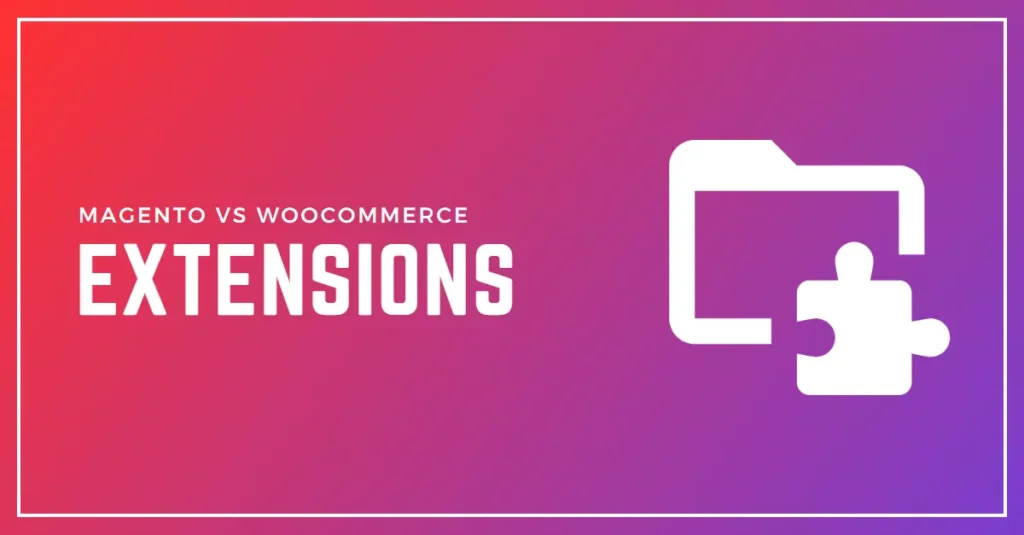
What types of plugins and extensions are available for WooCommerce?
WooCommerce boasts a large variety of plugins to enhance your store’s functionality, including options for payment gateways, shipping, SEO, social media integration, and more.
While many WooCommerce plugins and extensions are free, premium plugins can range from $29 to $299 or more. Depending on your store’s requirements, these additional costs can increase over time. Some popular WooCommerce plugins include WooCommerce Subscriptions, WooCommerce Memberships, and WooCommerce Product Add-Ons.
What types of plugins and extensions are available for Magento?
The Magento Marketplace offers a wide array of free and premium extensions to customize your store. Popular Magento extensions include Amasty Improved Layered Navigation, MagePlaza SEO Suite, and Mirasvit Reward Points.
While some Magento extensions are available for free, paid extensions can cost anywhere from $50 to $500 or more. Like with WooCommerce, these costs may accumulate as you add more functionality to your store.
WooCommerce vs Magento: Which platform has a more extensive ecosystem for store enhancements?
Both WooCommerce and Magento have a wide variety of plugins and extensions available. However, WooCommerce may offer a more extensive library due to its integration with the vast WordPress ecosystem.
Cost
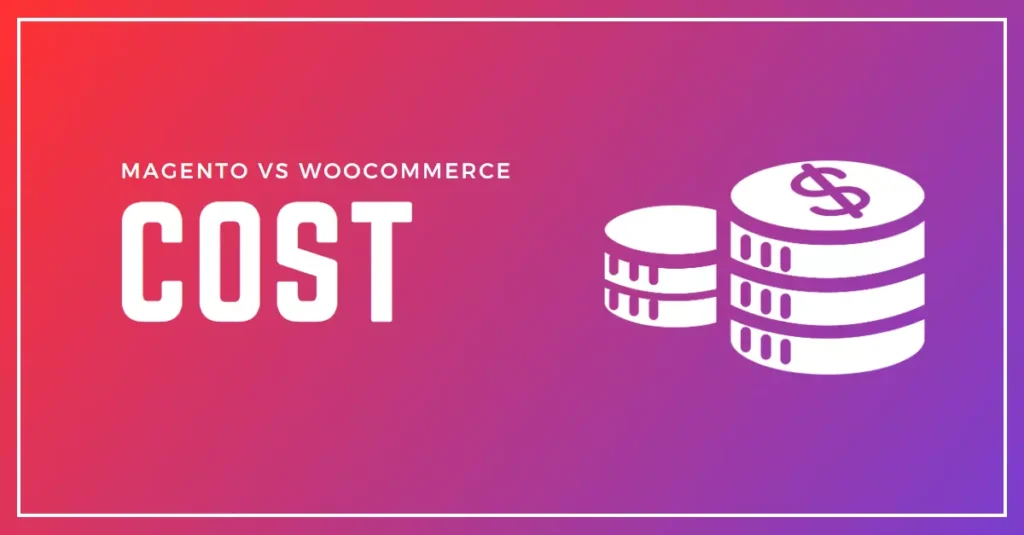
What are the costs associated with running a WooCommerce store?
WooCommerce is an open-source platform, meaning it is free to download and use. However, there are initial expenses to consider, such as web hosting, domain registration, and premium themes.
Recurring costs may include premium plugins, ongoing hosting fees, and SSL certificates. Depending on your store’s needs, these expenses can vary significantly.
What are the costs associated with running a Magento store?
Magento offers both an open-source version (Magento Open Source) and paid versions (Magento Commerce and Magento Commerce Cloud). Magento stores may also incur costs for development, maintenance, and hosting. These expenses can be higher than those of WooCommerce stores due to the need for more specialized development resources.
WooCommerce vs Magento: Which platform offers better value for money?
Both e-commerce platforms offer great value for money. However, due diligence should still be done prior to any purchase decisions being made regarding plugin purchases or subscriptions associated with each platform’s offerings respectively.
Community Support
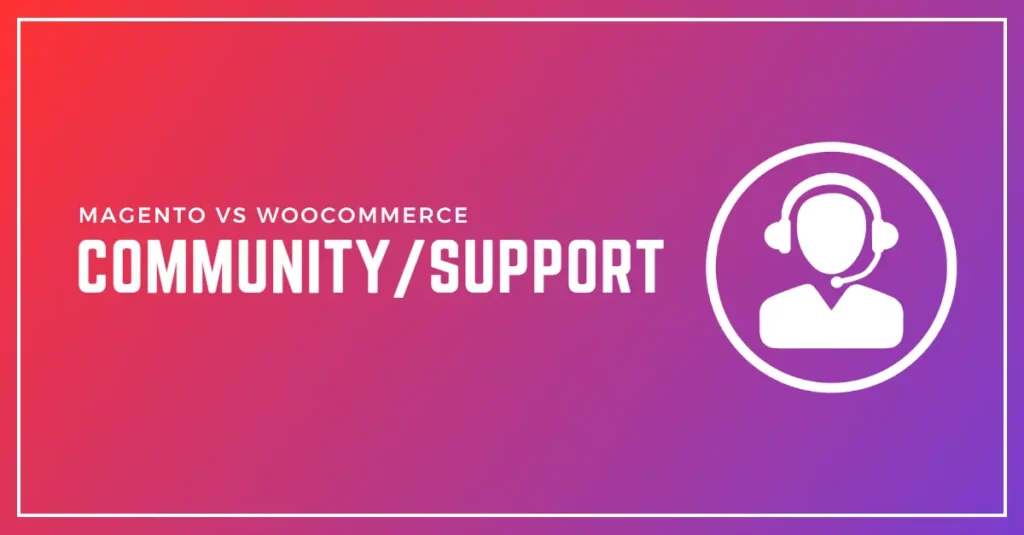
How strong and active is the WooCommerce community?
With over 5 million active installations, WooCommerce has a large and active community of users, developers, and experts. You can find support in WordPress forums, WooCommerce documentation, and various online resources.
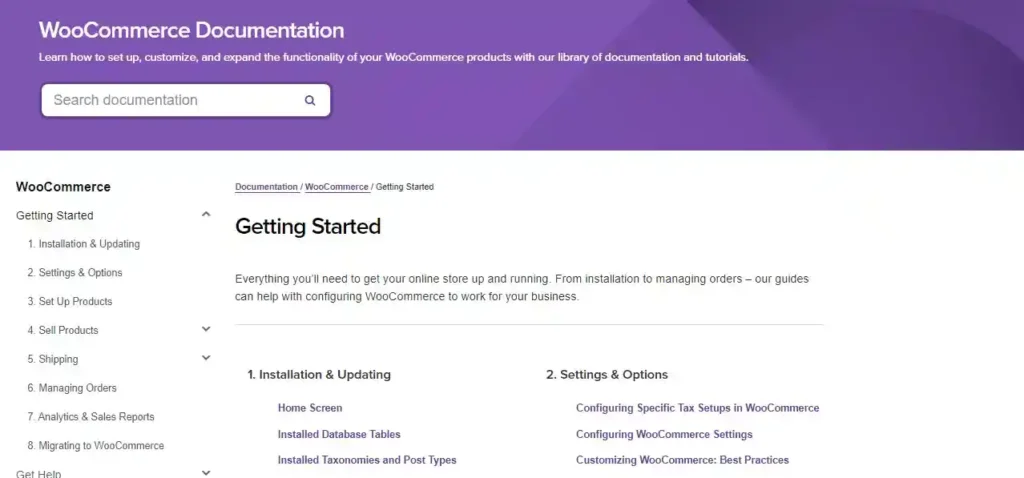
How strong and active is the Magento community?
Magento boasts a strong community with over 300,000 expert developers, and it has built a strong community around it. Magento offers forums, a developer network, and resources like the Magento DevDocs to help users navigate the platform.
The support services can encompass various aspects, such as aiding with relevant Adobe Commerce documentation, resolving support issues for Adobe Commerce, and granting direct access to the Adobe Commerce support team via a ticketing system.
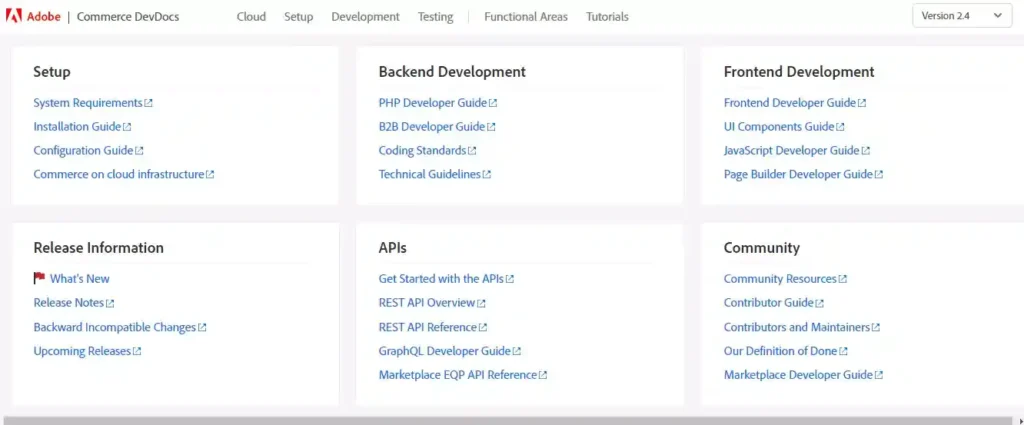
Also, read Top Magento Tech Support Firms.
WooCommerce vs Magento: Which platform has better support and resources?
Both WooCommerce and Magento have strong communities offering support and resources.
Security

How secure is WooCommerce?
WooCommerce is a secure ecommerce platform with regular updates and patches to address vulnerabilities. According to a report by Sucuri, 95.62% of infected CMS sites were WordPress sites. However, it’s essential to note that many of these hacks were due to outdated software, poor hosting, and weak passwords.
Store owners must ensure they use a secure web hosting provider and keep their WordPress installation, themes, and plugins up to date. WooCommerce also supports SSL certificates and various security plugins to enhance protection further.
How secure is Magento?
Magento is known for its advanced security measures, including dedicated security patches and a robust, built-in security system. The platform also has a Security Center that offers resources and best practices for securing your store.
Magento’s advanced security measures, especially in Magento Commerce and Magento Cloud, can provide more robust protection for your e-commerce store. These measures include built-in protection against DDoS attacks, Web Application Firewall (WAF), and data encryption.
Store owners need to ensure they apply security patches promptly and follow best practices for securing their stores.
Also, read Secure your store with Two-Factor Authentication.
Magento vs WooCommerce: Which platform offers better security measures?
When it comes to security and reliability, both WooCommerce and Magento can offer a comprehensive ecommerce solution. Magento offers an impressive array of advanced security measures on its Adobe Commerce Cloud edition. Its dedicated security patches also help keep your store safe from malicious actors or cyber-attacks.
On the other hand, WooCommerce is powered by WordPress and provides top-notch protection against data breaches with regular updates that are released automatically.
Payment Options and Gateways
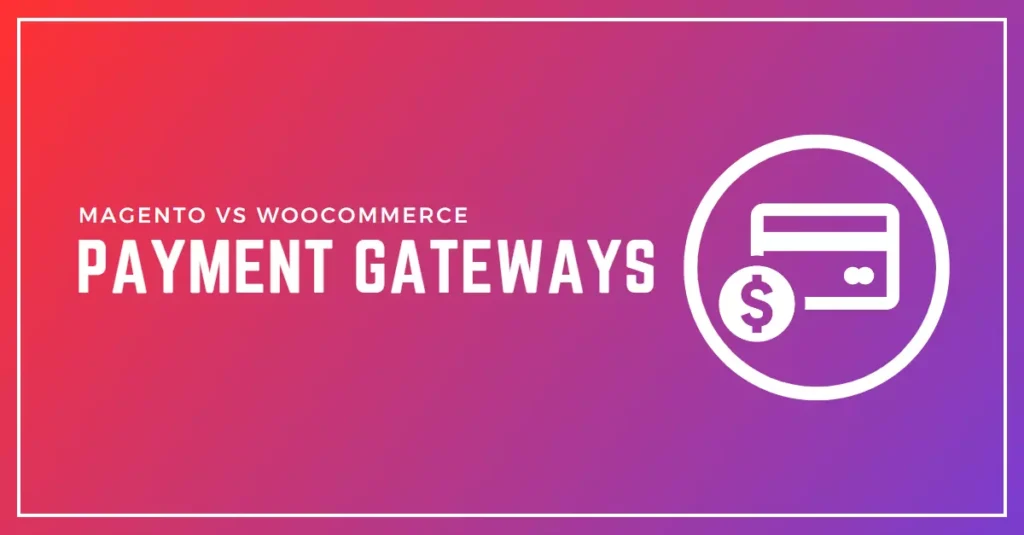
What payment processors are supported by WooCommerce?
WooCommerce supports a wide range of popular payment gateways, including PayPal, Stripe, Square, and Amazon Pay. Many additional gateways can be added through plugins, making it easy for store owners to offer multiple payment options to their customers.
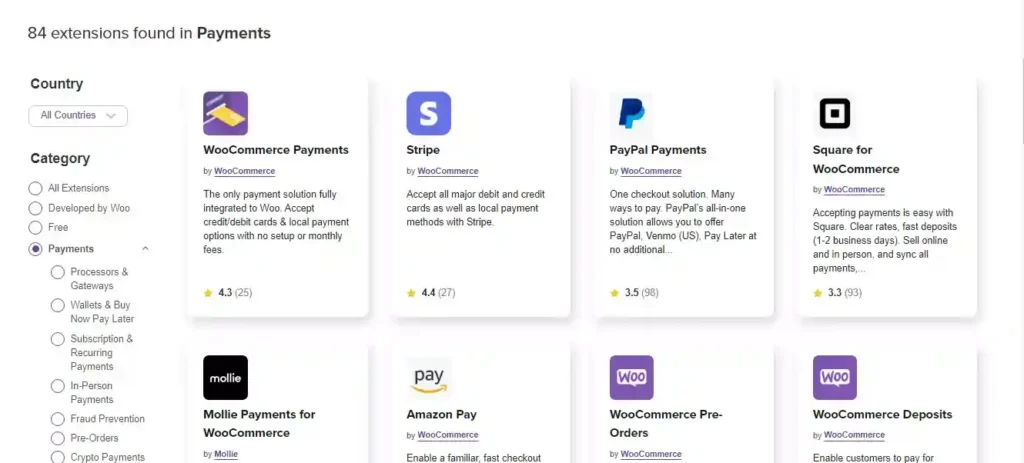
What payment processors are supported by Magento?
Magento supports numerous payment processors and gateways like PayPal, Stripe, Authorize.Net, and Braintree. Additional gateways can be integrated using extensions, providing store owners with a broad range of options for their customers.
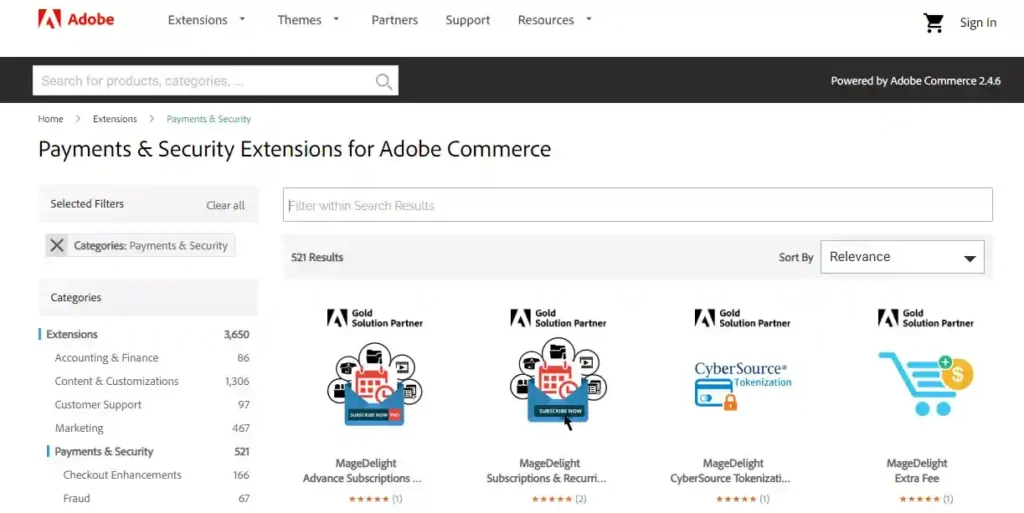
Magento vs WooCommerce: Which platform offers better options for payment processing?
Both WooCommerce and Magento provide extensive support for payment processors and gateways, making them equally capable of handling various payment options.
Also, read Stripe vs PayPal: which payment processor is better?
Web Hosting and Performance
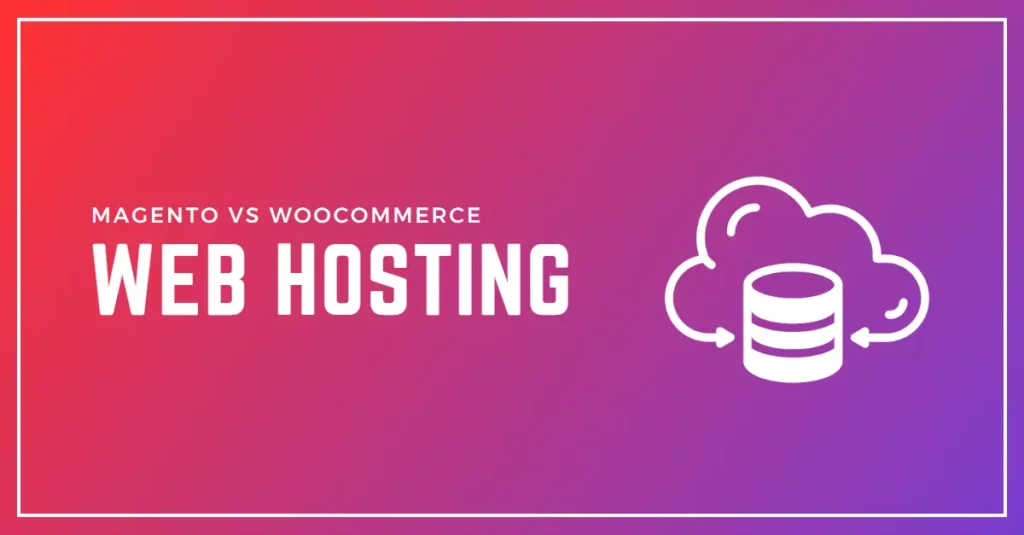
What are the web hosting requirements for WooCommerce stores?
WooCommerce stores require a web hosting provider that supports PHP and MySQL, which are standard requirements for most WordPress installations. Store owners should choose a reputable hosting provider with a focus on performance, security, and scalability to ensure optimal results.
What are the web hosting requirements for Magento stores?
Magento has higher hosting requirements compared to WooCommerce, requiring more server resources, memory, and processing power. System requirements include PHP, MySQL, ElasticSearch, Redis, RabbitMQ, and Composer. It is crucial to choose a hosting provider that specializes in Magento, such as Host Duplex, to ensure optimal performance and reliability, and ease of use.
Magento vs WooCommerce: Which platform offers better performance?
While both platforms can deliver excellent performance with the right hosting infrastructure, Magento is generally better suited for larger stores with a high volume of products and customers due to its more advanced caching and performance optimizations.
Bottom Line
WooCommerce and Magento are powerful e-commerce platforms with unique strengths and weaknesses. WooCommerce is a more beginner-friendly, cost-effective option, making it ideal for small to medium-sized businesses and WordPress users. While Magento is well-suited for businesses with ambitious growth plans and the resources to manage more complex requirements, offering advanced features, scalability, and security.
When choosing between WooCommerce and Magento, consider factors such as your business size, budget, technical expertise, and specific e-commerce needs. Ultimately, the best platform for your online store will depend on your unique requirements and goals.
FAQs
Which is better, Magento or WooCommerce?
Magento is designed for larger enterprises and mid-sized businesses and offers advanced features and scalability. WooCommerce is best suited for small businesses and startups and offers an easy-to-use platform with flexible shipping options and customizable product attributes. The true answer lies in the specific requirements of the project and the size of the business.
Can I migrate my online store from WooCommerce to Magento?
Yes, you can migrate your online store from WooCommerce to Magento or vice versa. However, this process can be challenging and time-consuming, as it requires meticulous planning and execution. It’s best to seek assistance from a professional team to ensure a smooth and successful migration that won’t compromise your store’s data or functionality. Don’t hesitate to reach out for expert help to make the switch as seamless as possible.
Which platform is better for SEO, Magento or WooCommerce?
Both Magento and WooCommerce offer a range of SEO optimization features, such as customizable URLs, metadata management, and sitemaps. However, Magento is generally considered to be more SEO-friendly due to its advanced features and flexibility in managing complex product catalogs.
How do I choose between Magento and WooCommerce?
Factors to consider when choosing between WooCommerce and Magento include business size, growth potential, budget, and development resources. Based on your requirements, one platform may be more suitable for your needs.
Before making a decision, ask yourself:
– What are your e-commerce goals and objectives?
– How much development knowledge and support do you have?
Consider your short and long-term plans for your store. Also, consider whether you can manage the platform independently or if you will need professional assistance.



Magento vs WooCommerce: The Best Platform Comparison in 2023